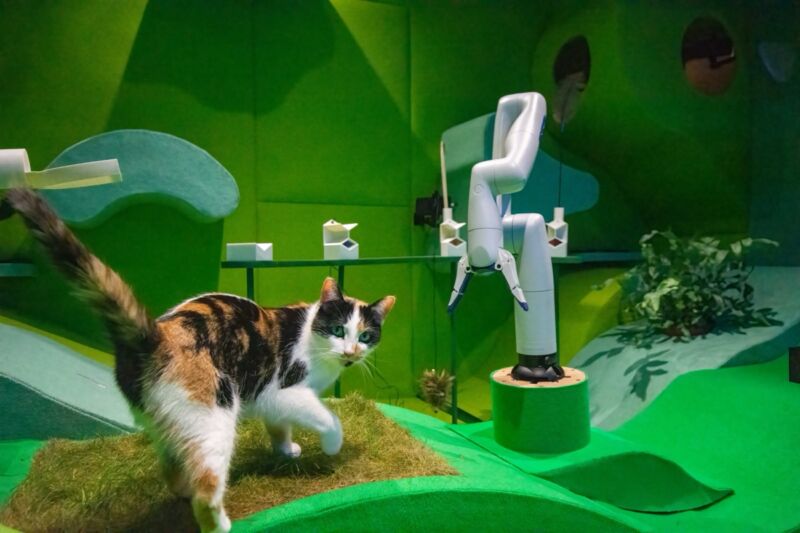Cats playing with robots proves a winning combo in novel art installation

Enlarge / A kitty named Clover prepares to play with a robot arm in the Cat Royale "multi-species" science/art installation . (credit: Blast Theory - Stephen Daly)
Cats and robots are a winning combination, as evidenced by all those videos of kitties riding on Roombas. And now we have Cat Royale, a "multispecies" live installation in which three cats regularly "played" with a robot over 12 days, carefully monitored by human operators. Created by computer scientists from the University of Nottingham in collaboration with artists from a group called Blast Theory, the installation debuted at the World Science Festival in Brisbane, Australia, last year and is now a touring exhibit. The accompanying YouTube video series recently won a Webby Award, and a paper outlining the insights gleaned from the experience was similarly voted best paper at the recent Computer-Human Conference (CHI'24).
"At first glance, the project is about designing a robot to enrich the lives of a family of cats by playing with them," said co-author Steve Benford of the University of Nottingham, who led the research, "Under the surface, however, it explores the question of what it takes to trust a robot to look after our loved ones and potentially ourselves." While cats might love Roombas, not all animal encounters with robots are positive: Guide dogs for the visually impaired can get confused by delivery robots, for example, while the rise of lawn mowing robots can have a negative impact on hedgehogs, per Benford et al.
Blast Theory and the scientists first held a series of exploratory workshops to ensure the installation and robotic design would take into account the welfare of the cats. "Creating a multispecies system-where cats, robots, and humans are all accounted for-takes more than just designing the robot," said co-author Eike Schneiders of Nottingham's Mixed Reality Lab about the primary takeaway from the project. "We had to ensure animal well-being at all times, while simultaneously ensuring that the interactive installation engaged the (human) audiences around the world. This involved consideration of many elements, including the design of the enclosure, the robot, and its underlying systems, the various roles of the humans-in-the-loop, and, of course, the selection of the cats."